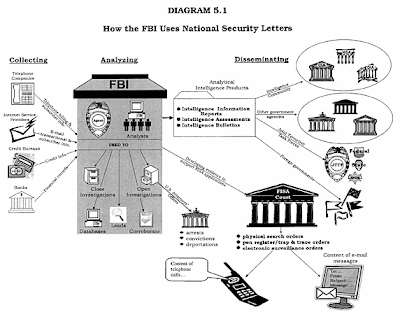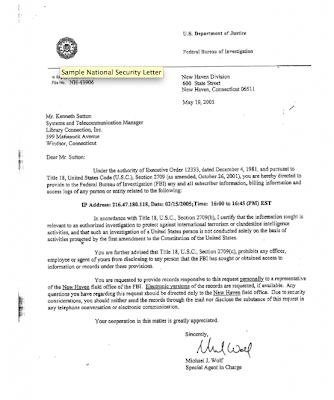This article was last updated on April 16, 2022
Canada: ![]() Oye! Times readers Get FREE $30 to spend on Amazon, Walmart…
Oye! Times readers Get FREE $30 to spend on Amazon, Walmart…
USA: ![]() Oye! Times readers Get FREE $30 to spend on Amazon, Walmart…Now that we are all aware of the shenanigans at the NSA, the use of FISA and FISC to spy on us all, there is another means that the government (and its proxy organizations) have to demand detailed information about your private internet and other communications.
Oye! Times readers Get FREE $30 to spend on Amazon, Walmart…Now that we are all aware of the shenanigans at the NSA, the use of FISA and FISC to spy on us all, there is another means that the government (and its proxy organizations) have to demand detailed information about your private internet and other communications.
Your local FBI office is staffed with Special Agents who are responsible for conducting national security investigations and for the enforcement of more than 300 federal statutes. These agents must be American citizens and must be at least 23 years of age before they can apply and may not apply after they are 37 years old. They must have a four-year degree from an accredited college or university and three years of professional work experience. They must qualify under one of five Special Agent Entry Programs which include accounting, computer science or information technology, language, law or diversified. They must also pass a background check and a physical fitness test. So, basically, they are nothing terribly "special". Unfortunately, the same cannot be said for the power that they wield.
Now, let's look at the power that these Special Agents and their field supervisors have. Let's say that for one reason or another, you find yourself in the FBI's figurative crosshairs (let's hope it's figurative!) for "security reasons". Your friendly neighbourhood FBI Special Agent can simply sign what is called a National Security Letter (or NSL) that demands detailed information about you from your ISP or other communications provider without:
1.) A court review or approval.
2.) Telling you that you are the subject of an NSL.
3.) Actually suspecting you of a crime.
The FBI can then get your true identity, your IP address and the IP addresses of any websites that you may happen to pass through, the email address of everyone that you email or who email you and the time and duration of all of your communications. This Letter also gives the FBI the right to access your private credit and banking information and, by law, the bank or organization is forbidden to notify you that you are the subject of an investigation. These Letters are also never subject to review by the Department of Justice and do not require the authorization of a judge, grand jury or prosecutor.
Here's a cool graphic from the ACLU showing how the FBI uses National Security Letters:
Here's what one of these frightening letters looks like, noting the phrase that "you are advised that Title 18… prohibits any officer, employee or agent of yours from disclosing to any person that the FBI has sought or obtained access to information or records under these provisions.":
National Security Letters were created in the 1970s for the purpose of investigating terrorism and espionage and narrowly allowed the FBI to investigate the customer records of individuals that were suspected of being foreign agents. Thanks to GW and the Patriot Act, the FBI has transformed the use of NSLs to include all United States residents and visitors, whether or not they are allegedly spies or terrorists.
Now that you've had a primer on yet another way that the government has to spy on the sweaty masses, I bet you're wondering how often the FBI uses National Security Letters, aren't you. Fortunately, the Office of the Attorney General releases this information annually, pursuant to FISA. Here is a copy of the letter submitted by the Department of Justice to the Majority Leader of the U.S. Senate for the calendar year 2012:
Notice that in the second last paragraph, the FBI made 15,229 NSL requests in 2012, excluding requests that were for subscriber information only. These NSL requests were looking for information on 6,223 different United States persons. By way of comparison, during the same time period, the federal government made "only" 1856 applications to the Foreign Intelligence Surveillance Court (FISC) for authority to conduct electronic surveillance and physical searches for foreign intelligence purposes, none of which were turned down.
More specifically, thanks to recent developments at Google, they have recently released a range of the number of NSLs that they have received in each year between 2009 and 2012 as shown here:
Just in case you thought it was safe to go back in the water, there's another "shark" waiting for you! My recommendation; research and select a reputable Virtual Private Network. While it may not protect you from every prying government organization, at the very least you'll provide them with a bit of a challenge when they are trying to stick their noses into your private business. The least that they can do is work hard to breach our illusion of privacy.
Click HERE to read more of Glen Asher's columns
You can publish this article on your website as long as you provide a link back to this page.






Be the first to comment